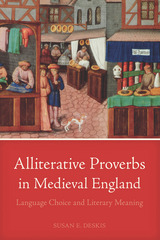
The proverb has been an underutilized resource in tracing the linguistic and intellectual cultures of the past. Making the fullest use of this material, this study, by Susan E. Deskis, is complex in its combination of philology, paroemiology, literary history, and sociolinguistics, ultimately reaching conclusions that are enlightening for both the literary and linguistic histories of medieval England. In the language ecology of England from about 1100 to about 1500, where English, French, and Latin compete for use, alliterative proverbs are marked not only by the choice of English as the language of expression but also because alliteration in Middle English connotes a conscious connection to the past. Alliterative Proverbs in Medieval England: Language Choice and Literary Meaning explores how that connection is exploited in various literary genres from school texts and sermons to romances and cycle plays.

This new collection by our greatest connoisseur of proverbs is the first and only comprehensive compilation of proverbial sayings, British and American, that are actually in current use in this century—old ones still part of common parlance, others recently coined, and familiar ones with new twists. It will be of inestimable value to students of the proverb, of more than passing interest to folklorists and cultural historians, and to the casual browser and language buff a delight.
Whiting has, in the course of fifty years' reading, culled these proverbial expressions from a huge range of sources, some seven thousand books as well as newspapers and magazines. Since proverbs are by nature popular, he has drawn heavily on popular writing such as detective stories and science fiction; with certain notable exceptions (James Joyce among them), major authors, writers of belles-lettres, have proved less fertile terrain than the purveyors of fiction for the masses. No one else has combed a comparable cross-section of the popular literature of this century in search of proverbial matter—and no one now could, given the ephemeral nature of those books. Moreover, only a scholar of Whiting's expertise could confidently identify the proverbial expressions therein, with all their inversions, variations, and parodies.
The volume is patterned after its predecessor, Whiting's Early American Proverbs and Proverbial Phrases. The sayings are alphabetized by key words, usually the first important noun or verb, and there are cross-references to other items of similar gist. The body of each entry consists of quotations, with their sources, in chronological order. For those who may wish to trace the prior history of a proverb or phrase, citations are provided to earlier collections and reference works in which it appears.
READERS
Browse our collection.
PUBLISHERS
See BiblioVault's publisher services.
STUDENT SERVICES
Files for college accessibility offices.
UChicago Accessibility Resources
home | accessibility | search | about | contact us
BiblioVault ® 2001 - 2024
The University of Chicago Press









